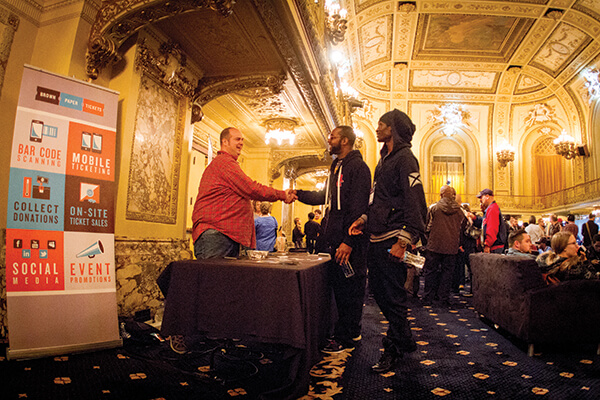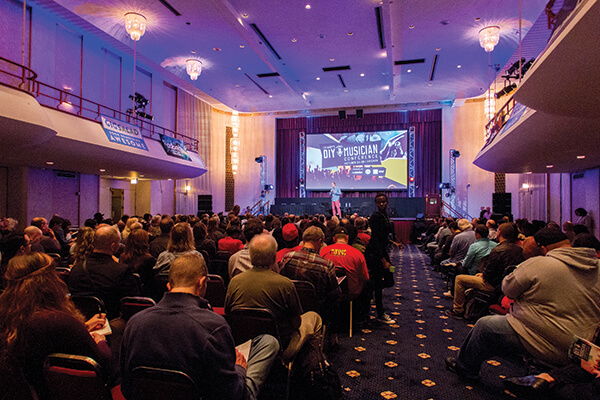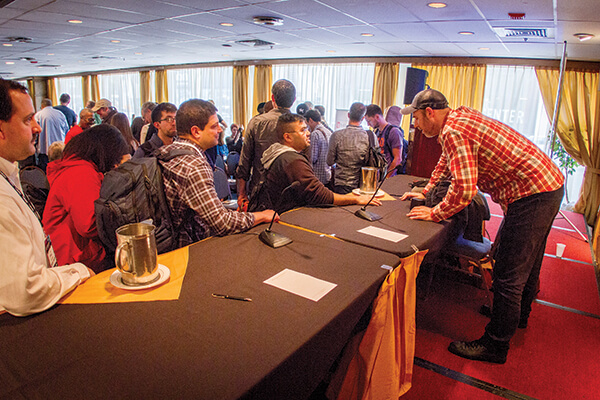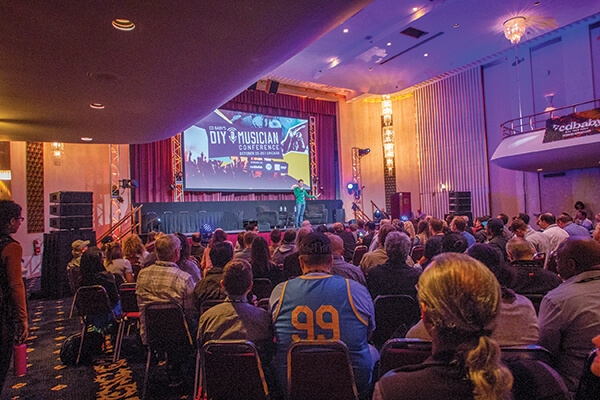5 Takeaways from CD Baby’s DIY Musicians Conference
Answering to years of popular demand, CD Baby hosted its first ever DIY Musicians Conference in Chicago from October 24-25. Over a thousand artists from forty-five states and eleven countries flooded the Congress Plaza Hotel to network with each other, attend panels and workshops featuring dozens of DIY industry heavyweights, and learn about topics ranging from new revenue streams and booking gigs to online marketing and live performance.
“For this conference, we tried to make it feel different, that this is for artists,” Kevin Breuner, CD Baby’s VP of Marketing, told me before it started. “It was about the panels, the sessions, we’ve been meeting with all the speakers and embedding everything to make sure that people walk away with actionable advice, that they can feel like they’re empowered to move their career forward.”

During breaks, the Gold Room served as a hangout space for attendees to network and learn about the services provided by various conference sponsors.
On that front, the conference proved to be a rousing success. As I reflected on the overwhelming deluge of information presented, five lessons stood out:
- Make sure you’ve opened every possible revenue stream.
A panel featuring Breuner, CD Baby Pro’s Rob Filomena, SoundExchange’s Lauren Danzy, and Rumblefish’s J. Gibson explained the ways that their companies help artists receive royalties and licensing fees that they may not know exist.
“Money is sitting at SoundExchange for a lot of artists, probably some of you,” said Danzy. “Publishing is going to be your retirement fund when it gets down to it,” added Filomena. In brief, each of the panelists explained what their company does and why it’s important for independent artists to use their services: SoundExchange pays out royalties for digital radio airplay, CD Baby Pro is the distributor’s publishing administration wing, and Rumblefish helps artists micro-license their songs to video makers and monetize their songs on YouTube.
All three organizations cover gaps in what a PRO and the Harry Fox Agency can do for artists, and all three rely on extensive metadata collection to compensate artists accurately. To that end, they emphasized the importance of making sure artists’ songs are correctly labeled and uniquely identifiable on the Internet—essentially, they apply the rules of SEO to songs. They also stressed that artists should sign up to use all of these services, or else risk leaving uncollected revenue on the table.

The Great Hall of the Congress Plaza
- Your live performance won’t just happen: it requires thought and work.
One of the conference’s three keynote speakers was live music producer Tom Jackson, who has worked with such artists as Taylor Swift and Shawn Mendes. He provided a teaser of what he calls his “Live Music Method” by making over a band called The New York Rock onstage. In just a half hour of work, the band’s performance improved by a jaw-dropping degree, and Jackson sold a healthy amount of his DVDs after the demonstration.
The key point he hammered home was that audiences attend concerts to be captured and engaged, to experience moments, and to have their lives changed. “Are you doing that to them or are you up here doing musical masturbation?” he asked the crowd.
He likened live performance to building a house, listing off several key steps. First comes the plan, which must be constructed with the audience in mind—to just “wing it” is to sacrifice control over a crucial method of making fans and money. Next comes the foundation, represented by the authority with which you carry yourself onstage; showing nerves is not an option. Then the house must be built with a dynamic setlist that varies both sonically and visually: “If the songs look the same after three songs, they’ll start to sound the same,” said Jackson. Finally, the artist moves into the house, developing themes and characters that allow their personality to shine.

Benji Rogers, CEO of PledgeMusic, speaks with conference attendees after his presentation on online marketing.
- Find your superfans, ask them what they want, and then deliver it.
There’s a difference between consumers and fans that the music industry doesn’t understand, according to Benji Rogers, the founder and CEO of PledgeMusic. “Superfans are weird,” he said. “They want and expect more. 17% of people are superfans, but they’re responsible for 61% of industry revenue.” Superfans are invested in artists because they feel ownership of the artists’ material—and the more openly the artist invites the fans into the experience and the more reasons the artist gives fans to be invested, the more they will consume everything that’s made available.
Rogers outlined a number of online marketing tools that can help this process: email, direct-to-fan experiences (PledgeMusic’s trade), crowdfunding, and developing technologies such as streaming concerts and block chain payment. Artists must find out which tools work for them (it’s foolish to waste time on Instagram if you don’t use it well) and use them to effectively share their story, to make the superfans feel special and give them as many window as possible through which they can view and interact with their heroes. “You have to be authentic, driven, motivated,” said Rogers.
- Find creative little ways to make or save more money, and they’ll add up.
In the last event of the conference, industrial rock maven and music business entrepreneur Martin Atkins presented a hilarious, profanity-laced talk entitled “50 Ways to Make $100,000 More Next Year.” Over the course of an hour, he threw dozens of muffins into the audience, encouraged the “rock stars” to grab each other’s crotches, and emptied an entire canister of AXE’s Anarchy fragrance onstage. But the shock value had a purpose: to get the attendees actively thinking of ways to adapt and thrive in the ever-changing music industry.
“Bitterness and pettiness are the enemy of creativity,” he said. “We need to use our creativity to f**k them up!” The countless strategies he recommended—having a tip jar, rolling t-shirts instead of folding them, having an album release party at a Laundromat and doing fans’ laundry there, painting the producer’s house instead of paying for studio time—all have a few common threads: they require an utter fearlessness, they focus on relationship building, and they follow the common sense dictum of “do more of what works, less of what doesn’t.” To stand out in the DIY world, artists need to first dedicate themselves entirely to their craft; Atkins even suggested living out of a tour van. Second, they need to provide an unforgettable experience, driven by their creative sensibilities. “Become more than just a band,” said Atkins. “Become a lifestyle. Become an experience.” And then, when people want to pay for that experience, artists need to have every single possible revenue stream open and optimized.

The Great Hall of the Congress Plaza, where the DIY Musicians Conference’s keynote speakers addressed over 1,000 independent artists.
- Your music must be great.
With all of the advice given at the conference came this stipulation: “You can get all the principles of marketing wrong if what you make is great, because people can’t keep greatness to themselves,” said Benji Rogers. Though DIY musicians need to operate like startups, handling every aspect of the business themselves, good marketing and wherewithal regarding revenue streams are worth nothing if their music doesn’t forge enduring connections with listeners. Artists must be artists first—if their songs aren’t exceptional, making them exceptional needs to be the priority.
CD Baby is already planning a sequel to the DIY Musicians Conference, and it should be a can’t-miss event given how successful this year’s installation was.
For more, visit www.diymusiciancon.com.
ABOUT THE AUTHOR
Zach Blumenfeld is a freelance music journalist from Chicago. He will vigorously defend his city’s music scene against any coastal detractors, though that’s probably just his Midwestern inferiority complex acting up. He’s an alumnus of Vanderbilt University, where he hosted a live performance/interview radio show for three years, and now he spends his nights reviewing concerts for the Chicago publication Gapers Block. You can follow him on Twitter @zachblumy.
